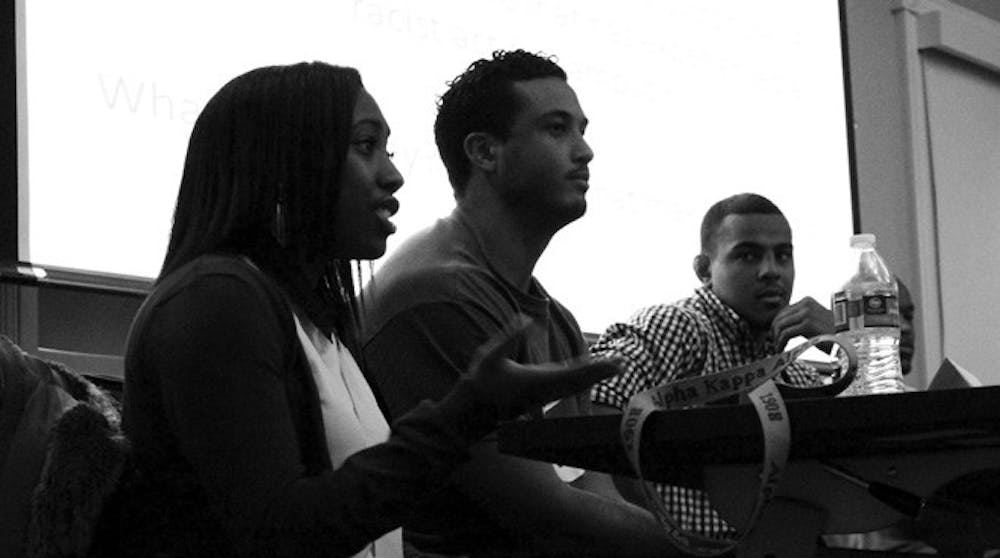After Destiny LeVere, sophomore and vice president of Alpha Kappa Alpha Sorority, Inc.'s chapter at University of Richmond, noticed the frequency of racist interactions among students at Richmond, she came up with the idea for an open discussion, which her sorority hosted.
"Race at Richmond," a timely conversation just before the end of Black History Month, allowed students to talk about issues of race and racism on Richmond's campus Feb. 27.
"It's a touchy topic, and no one ever wants to talk about it," LeVere said, "but I wanted to go ahead and start the conversation."
LeVere said she felt "Race at Richmond" was a necessary discussion because of the racist acts she had personally witnessed and been a victim of at Richmond and growing up.
"All of my life, I've had to deal with this," LeVere said.
LeVere asked friends and faculty to recommend panelists for the forum. She said she had made a list of 32 potential panelists, but most of them declined. "When I asked Caucasian males to participate, they all said no," LeVere said.
LeVere eventually narrowed the list to six student panelists: Dominique Durante, Westhampton College '15; Omar Howard, Richmond College '16; Amelia Mitrotz, WC '16; Ross Rosenblatt, RC '14; Andrew Tallman, RC '14; and Montel White, RC '14.
The first question the panel addressed was, "Why do you think race is not spoken of very frequently on this campus?"
"Unfortunately, the vast majority of the campus doesn't see race issues as a problem," Rosenblatt said. But Manar Aboul-Nour, sophomore and member of the audience, said she completely disagreed with him.
"We all know this is still an issue," Aboul-Nour said. "We just choose to go into denial."
LeVere then asked whether the students present had ever been a victim or witness of a racist act on campus.
Four students mentioned concerns about the roommate selection process for incoming freshmen. They agreed that it seemed as though white students were usually randomly paired with other white students, and minority students with minority students.
Enjoy what you're reading?
Signup for our newsletter
Gil Villanueva, dean of admission, disagreed. "I'm not so sure there's some grand conspiracy out there," he said. He said Richmond and other schools would not work against students' interests in this way, because they wanted to retain the students they worked hard to recruit.
A specific topic that came up during the conversation was the Black History Month dinner at the Heilman Dining Center, which featured decorations depicting a wheelbarrow with cotton and offended some students, LeVere said.
"It is part of our history, but it's not something you really want to embrace," Tallman said. "Black History Month should be a celebration of our people, not about what we went through."
In addition to students like LeVere, two university offices are working to stop the harmful effects of racism at Richmond.
The first is Common Ground, Richmond's diversity initiative. Ted Lewis, associate director of Common Ground for LGBTQ Campus Life, said, "Under President Ayers' leadership in particular, from what I've heard, there has been a dramatic increase in the number of U.S. students of color at the institution." According to the university's website, 24 percent of this year's incoming class was U.S. students of color.
But Lewis said students had talked to him about something called the "Richmond after dark phenomenon." At parties and social events, segregation is usually more prevalent, he said.
According to some students at "Race at Richmond," the classroom still wasn't a completely safe space.
Shaleetta Hicks, a senior who identifies as black, said one professor told her she did not expect her to be successful in a certain class because previous black students in that class had not performed well.
"I dropped the class the next day," Hicks said.
The other office dedicated to supporting diversity at Richmond is the Office of Multicultural Affairs. This departments plans programming for Black History Month, the Latino-Hispanic Heritage Celebration and Asian Heritage Month.
LeVere said she hoped to host events similar to "Race at Richmond" in the future--even within the next month. This time, she did not want professors to participate, because they might have a skewed perspective based only on classroom observations, she said. But she said at future discussions, she would incorporate faculty and staff perspectives as well.
Support independent student media
You can make a tax-deductible donation by clicking the button below, which takes you to our secure PayPal account. The page is set up to receive contributions in whatever amount you designate. We look forward to using the money we raise to further our mission of providing honest and accurate information to students, faculty, staff, alumni and others in the general public.
Donate Now



